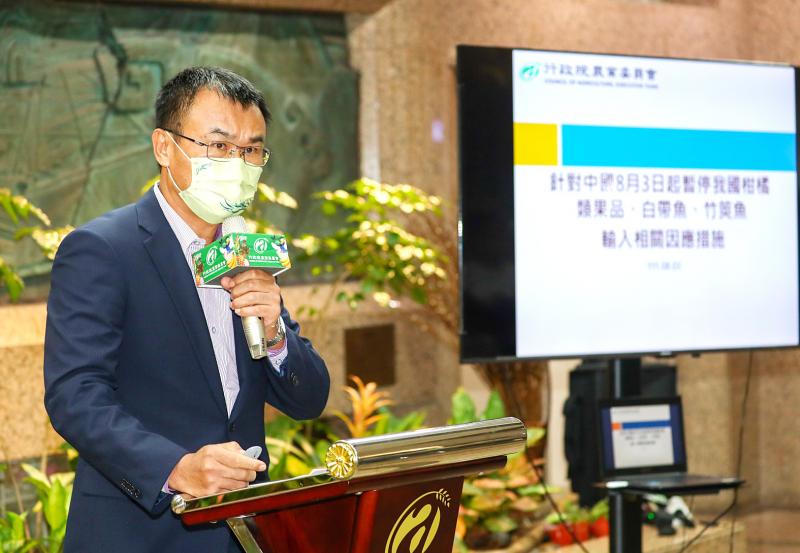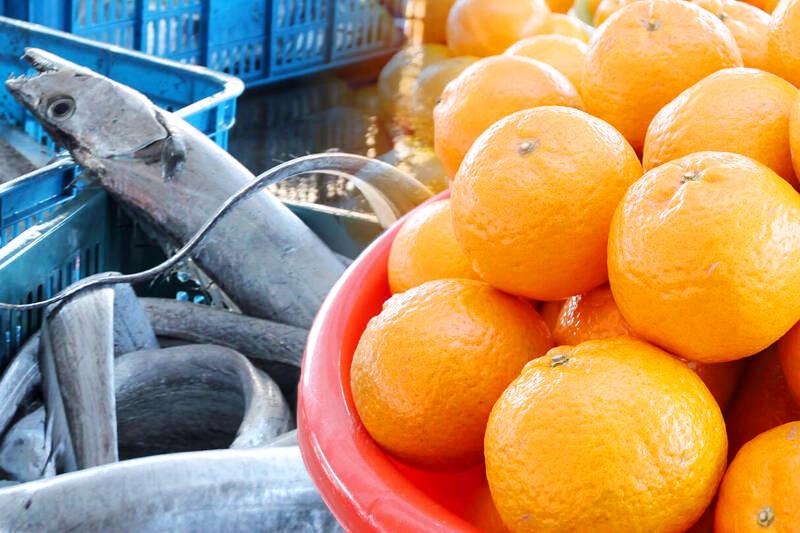The government will continue to diversify its export markets to prevent China from undermining its agricultural and fisheries industries, Council of Agriculture Minister Chen Chi-chung (陳吉仲) said yesterday.
Just hours after US House of Representatives Speaker Nancy Pelosi arrived in Taiwan on a visit, the Chinese government announced that it would temporarily suspend imports of citrus fruits and two types of fish from Taiwan, as well as exports of natural sand.
China’s General Administration of Customs has suspended imports of refrigerated largehead hairtail and frozen Japanese horse mackerel from Taiwan due to repeated discovery of the COVID-19 virus on packaging materials, Chinese media reports said yesterday.

Photo: CNA
The customs bureau has also suspended imports of citrus fruit from Taiwan due to the presence of citrus mealybug and excess residues of two types of pesticides, the reports said.
Prior to Pelosi’s arrival, the bureau on Monday night imposed temporary import bans on products from more than 100 Taiwanese food manufacturers, including well-known brands such as I-Mei Foods Co, Wei Chuan Foods Corp and Kuai Kuai Co.
Chen told a news conference in Taipei that the bans target products originating from all parts of Taiwan and is successful in its intent of affecting Taiwanese exports, but the Council of Agriculture is looking at measures to stabilize prices.

Photo: Taipei Times
“We will definitely take care of our fishers and farmers,” he added.
The council estimates that more than 8,000 tonnes of citruses, 5,500 tonnes of largehead hairtails and 1,000 tonnes of Japanese horse mackerel would be affected, he said.
Aside from helping fishers and farmers seek new markets, the council would also provide subsidies, he added.
Taiwan is not ruling out seeking arbitration from the WTO over China’s banning of Taiwanese citruses, which are listed as part of accepted agricultural products under the Economic Cooperation Framework Agreement, he said
Starting on Monday next week, any purchases from platforms such as the Farmers’ Association of more than NT$600 would receive a NT$200 agritourism voucher, Chen said, adding that the council is planning to hand out 300,000 vouchers.
The council has always rebutted Chinese allegations of bugs or excessive residues of certain chemicals by providing scientific-based evidence, he said, adding that it would continue to do so.
Separately, Executive Yuan spokesman Lo Ping-cheng (羅秉成) said all government agencies should be prepared for the possibility of China arbitrarily banning more Taiwanese products.
Chinese Nationalist Party (KMT) Chairman Eric Chu (朱立倫) said that Chinese military threats and bans on Taiwanese agricultural and fishery products would harm cross-strait peace and affect regional stability.
He said that he hoped farmers’ and fishers’ livelihoods would not be affected.
Chu called for continued dialogue and not mutual animosity, adding that this is a principle that the KMT upholds.
Additional reporting by Lee Hsin-fang, Lin Liang-sheng and CNA

Chinese spouse and influencer Guan Guan’s (關關) residency permit has been revoked for repeatedly posting pro-China videos that threaten national security, the National Immigration Agency confirmed today. Guan Guan has said many controversial statements in her videos posted to Douyin (抖音), including “the red flag will soon be painted all over Taiwan” and “Taiwan is an inseparable part of China,” and expressing hope for expedited reunification. The agency last year received multiple reports alleging that Guan Guan had advocated for armed reunification. After verifying the reports, the agency last month issued a notice requiring her to appear and explain her actions. Guan

GIVE AND TAKE: Blood demand continues to rise each year, while fewer young donors are available due to the nation’s falling birthrate, a doctor said Blood donors can redeem points earned from donations to obtain limited edition Formosan black bear travel mugs, the Kaohsiung Blood Center said yesterday, as it announced a goal of stocking 20,000 units of blood prior to the Lunar New Year. The last month of the lunar year is National Blood Donation Month, when local centers seek to stockpile blood for use during the Lunar New Year holiday. The blood demand in southern Taiwan — including Tainan and Kaohsiung, as well as Chiayi, Pingtung, Penghu and Taitung counties — is about 2,000 units per day, the center said. The donation campaign aims to boost

The Kaohsiung Tourism Bureau audited six hotels in an effort to prevent price gouging ahead of Korean band BTS’ concert tour in the city scheduled for Nov. 19, 21 and 22 this year. The bureau on Friday said that the audits — conducted in response to allegations of unfair pricing posted on social media — found no wrongdoing. These establishments included the local branches of Chateau de Chine, Hotel Nikko, My Humble House, and Grand Hai Lai, it said, adding that the Consumer Protection Commission would have penalized price gougers had the accusations been substantiated. The bureau said the Tourism Development Act

The military yesterday said it has located the flight data recorder, or black box, of an F-16V jet that disappeared off eastern Taiwan earlier this month, and it would soon deploy a salvage team to try to retrieve it. Air Force Command Headquarters said that while it had pinned down the location of the black box, it was still searching for the aircraft’s sole pilot, air force Captain Hsin Po-yi (辛柏毅). Without providing details, the air force said it had located the black box days after detecting some intermittent signals and would now engage a team of professionals to retrieve it. The air